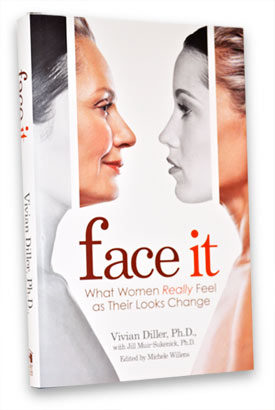- Home |
- Bio |
- Psychotherapy Practice |
- Expertise/Consulting |
- Book |
- Articles |
- Videos |
- Photos |
- Events |
- Contact


What Women Really Feel as Their Looks Change
Chapter One: A Generation Lost and Confused
…the democratic idea has not extended to aesthetic variation; instead the aesthetic idea has paradoxically become narrower over the last few decades.
— Susan Orbach
Is This What We Fought For?
Beauty is antithetical to our democratic ideals. It is distributed unfairly and unequally and this does not sit well with other values held by most evolved women. Consequently, many of us deal with the subject by dismissing it as insufficiently weighty, anti-feminist, un-intellectual, and culturally induced. Others hold contempt for those who are blessed with great genes. Some just cope by using cognitive dissonance, a mental trick that allows us to feel more comfortable with a reality we cannot control: concluding, for example, that most beautiful women are stupid. Sure, we’ve occasionally heard of the brainy blonde but not nearly as often as her dumb counterpart.
In spite of these cognitive acrobatics and rationalizations, so many of us continue to struggle reconciling who we are with how we look. Why does our appearance matter to us even if our politics, beliefs, and intellect tell us it shouldn’t? To understand this dilemma, we have to recognize the biological and cultural roles beauty plays in women’s lives.
What has always been—and remains—true is that beauty, in its purist sense, is a universal staple of human experience. It plays a powerful and fundamental role in our personal and professional lives. It is a basic human pleasure that will never go away.
Scientific studies have been conducted to demonstrate that humans are hard-wired to react to beauty. Recent research supports the belief that attractive physical features serve evolution, propelling the survival of our species. Psycho-sociologists have found that people who are commonly considered attractive seem to survive better than those who aren’t. This has led them to infer that good-looking people have stronger immune systems, more robust genes, and higher mate-value. Other studies tell us that what is considered attractive is similar across varied and unrelated cultures; for example, men generally are more attracted to women with large eyes and small noses set in round faces—features often associated with infants. And MRI and PET scans provide further evidence about the importance of beauty: Female brain activity has been shown to increase when women are told they are being admired by men. Male brains register more activity when viewing women they consider attractive.
Developmental research reveals that newborns not only quickly recognize facial features but also demonstrate preference for faces independently rated as attractive. This natural bias for beauty evolves into deep-seated stereotypes that result in a psychological phenomenon called “The Halo Effect,” which says that the quality of one trait is automatically applied to all parts of the object being observed. For example, someone who has the positive trait of being beautiful is also assumed to be responsible, intelligent, adaptable, and so on. This translates into a tendency for attractive people to be hired faster, get better jobs, earn more money, and even get acquitted more often. In essence, those who are physically blessed are not simply accorded more leeway in life, they are universally and positively recognized and rewarded.
It’s not surprising then that the desire to be attractive and perceived as such remains important to women of all ages across the world and spans all ages. Sociologist Naomi Wolf writes, “Beauty is a currency system like the gold standard.” Most women agree, reporting that good looks continue to be associated with respect, legitimacy, and power in their relationships with others. Actress and model Isabella Rosselini says, “In monetary terms, beauty pays more than anything.”
What do these facts and inequities about physical beauty mean to a generation of women whose childlike faces are fast becoming distant memories? It could lead you to conclude that we are right back where we started, with science confirming the sentiment supported by so many popular books; that it is what’s outside that counts and that we should in fact seek ways How Not To Look Old. Or, accept our biology and resign ourselves to an inevitable fate, as Lucille Ball jokingly suggested, “The secret of staying younger is to live honestly, eat slowly, and lie about your age.” Easy to say, but it’s not so simple.